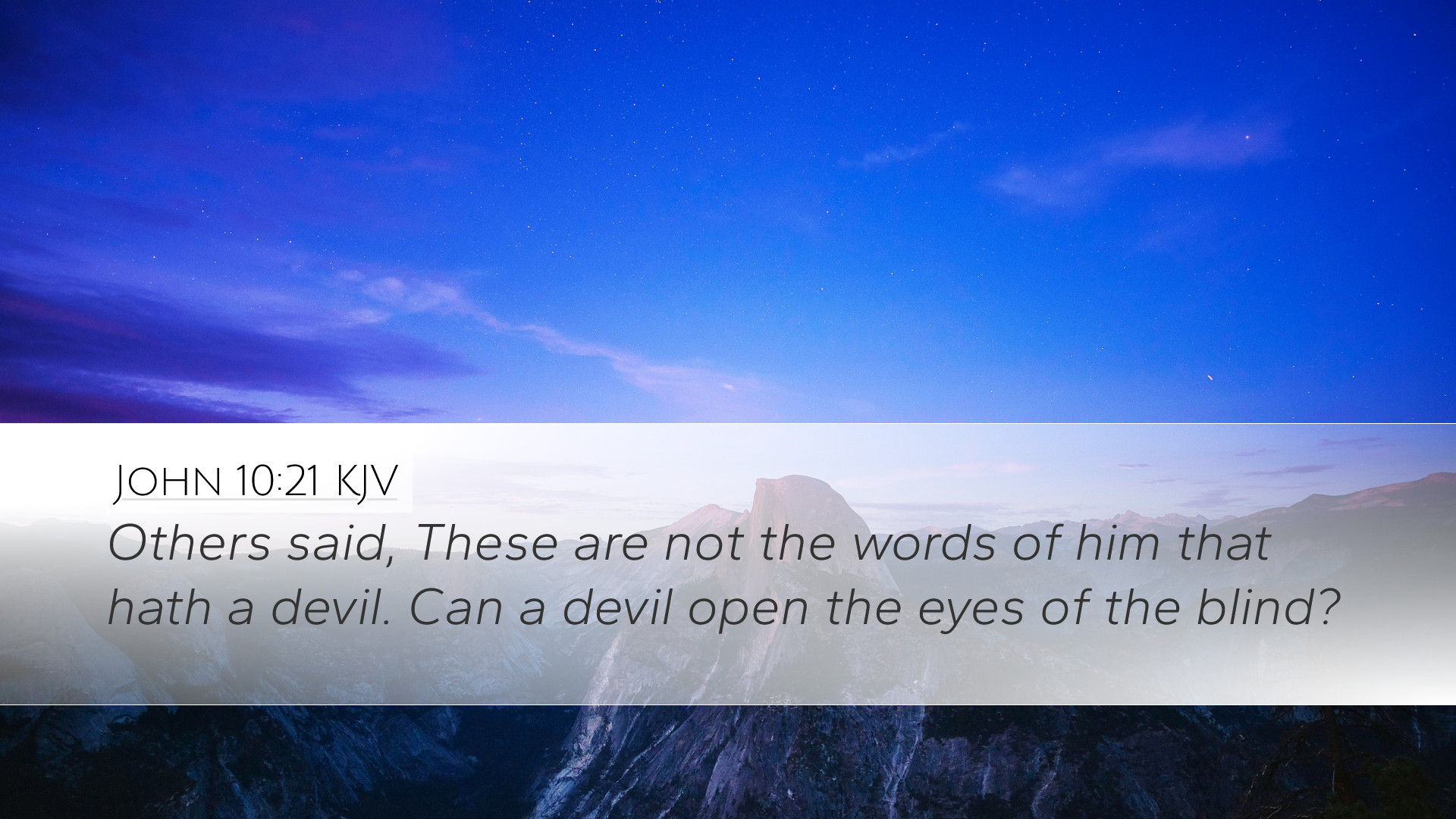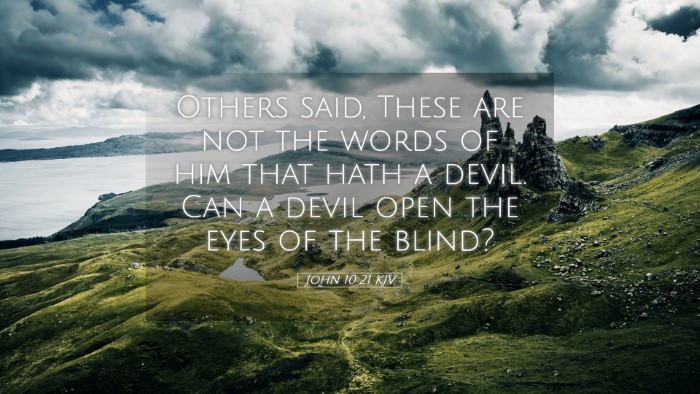Commentary on John 10:21
Bible Verse: "And others said, 'These are not the words of one who is oppressed by a demon. Can a demon open the eyes of the blind?'" (John 10:21, ESV)
Introduction
This verse occurs within the context of Jesus' teachings about being the Good Shepherd, revealing a profound dialogue surrounding His identity and divine authority. In John 10, we witness a mixed response from the audience as they grapple with the implications of His claims and miracles. The commentary from notable scholars sheds light on the theological significance of this verse, inviting pastors, students, theologians, and Bible scholars to delve deeper into its meanings.
The Context of John 10
The broader chapter of John 10 is essential to understanding this specific verse. Jesus contrasts Himself with false shepherds and emphasizes His role as the one who lays down His life for the sheep. The miracle of raising Lazarus and His healing of the blind man have set the stage for a display of authority that stirs both admiration and skepticism.
Recognition of Jesus' Authority
- Matthew Henry: Henry notes that the remarks of the crowd show a clear division in their understanding of Jesus. While some reject His claims, others recognize the power evident in His works. It demonstrates a movement from disbelief to consideration when faced with the miraculous.
- Albert Barnes: Barnes emphasizes the logical reasoning of those who point out the inconsistency of attributing such miraculous works to demonic influence. Barnes suggests that the miraculous acts of Jesus serve as validation of His divine mission, challenging skeptics with the reality of the good they manifest.
- Adam Clarke: Clarke elaborates that the phrase "open the eyes of the blind" refers not only to physical healing but also to a spiritual awakening. He asserts that recognition of Jesus' divine nature leads to deeper understanding and ultimately faith.
Theological Implications
This verse invites reflection on several critical theological themes:
- Divine vs. Demonic: The audience's discourse highlights an important theological distinction between the works of Christ and the actions attributed to evil forces. This is vital for understanding the nature of Christ's ministry, affirming that His miracles come from divine holiness rather than malevolent influence.
- The Nature of Faith: The contrasting opinions reflect the journey of faith. Some resonate with the truth of Jesus’ claims while others are blinded by skepticism. The verse indicates that encountering Jesus—through His words and works—can provoke either belief or resistance.
- Christological Significance: The acknowledgment that no demon could enact such miracles implies a high Christology. The verse points towards the complexities of Christ’s identity: fully divine, capable of performing what only God can do, thus eliciting worship rather than condemnation.
Practical Applications
Given the profound reflections on this verse, several practical applications emerge for modern believers:
- Encouragement to Seek Truth: Just as the audience wrestled with the identity of Jesus, Christians today are encouraged to investigate and affirm their faith, not based merely on tradition but on the reality of Christ’s works.
- Engaging with Doubts and Questions: The responses illustrate that doubt can coexist with a desire for understanding. It's essential for pastoral leaders to create environments where questions can be safely pursued in a search for truth.
- Celebrating Miraculous Works: The verse serves as a reminder that recognizing the work of God in our lives leads to glorification of Christ. Believers are called to testify to the miracles they experience, bearing witness to His transformational power.
Conclusion
John 10:21 presents a pivotal moment in the dialogue about the identity of Jesus. The comments from Matthew Henry, Albert Barnes, and Adam Clarke collectively underscore the importance of understanding Christ’s authority as authentically divine, while also recognizing the spectrum of faith present in those who encounter Him. This verse not only enriches theological conversations but also serves as a catalyst for personal reflection and communal discourse on the nature of belief in the face of skepticism. As modern readers engage with this sacred text, may they find both challenge and encouragement to pursue a deeper faith journey rooted in the compelling nature of Christ's ministry and identity.


